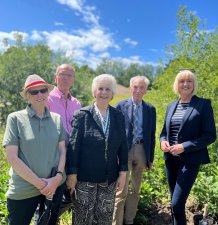Articles

Volunteers mark decade of horticulture and friendship at community garden connecting students and their neighbours
Volunteers mark decade of horticulture and friendship at community garden connecting students and their neighbours
Volunteers are marking a decade of innovative horticulture at Exeter’s Community Garden - where students work with their neighbours to cultivate food and friendship.
The beautiful space, at the University of Exeter’s Streatham campus, is helping people to learn new skills, meet friends and protect the local environment and biodiversity.
Volunteers are experimenting with new ways to enhance the habitat, which is also a teaching space for students studying food security and sustainability.
Professor Lisa Roberts, Vice Chancellor of the University of Exeter, and Exeter’s Lord Mayor Yolonda Henson joined volunteers – which include students, staff and local residents, at a celebration event to mark Exeter Community Garden’s ten anniversary.
Currently blooming in an orchard, polytunnels and raised beds are different varieties of garlic, potatoes, salad crops, herbs, beans and bunching onions. Volunteers hope a vine will produce edible grapes this year, and for a good crop of apples, pears, plums and medlars.
Later this year the gardeners will again make preserves from their blackberries, sloes and rosehips.
Volunteers have developed a composting system which ensures no weeds or vegetation is thrown away, and the grass is cut as infrequently as possible. Water is harvested for the polytunnels via butts.
Gardeners are hoping to boost biodiversity through a new area dedicated to wildlife, where they can sit and feel connected to nature.
Around 20 students and people living locally volunteer at the garden twice a week. The space is also used by MA Food Studies students and by medical and archaeology students.
Volunteers have used the space for their own creative projects on willow weaving and wood carving, and have worked with staff at Exeter’s Royal Albert Memorial Museum on research about the history and traditions of wassailing.
Former University of Exeter Chancellor Floella Benjamin planted a “Chancellor” mulberry tree on a visit in 2014.
During her visit Professor Roberts planted a guelder rose. She said: ‘’I would like to congratulate all those who have been involved in setting up this garden ten years ago and keeping it going. As many of you know our new strategy is all about creating a more sustainable, healthier and fairer future and what a great example of how we are doing that right here.’’
Dr Paul Cleave, Chairman of the Exeter Community Garden said: “In the past ten years the garden has grown and evolved so much. It started as a space where students could grow their own fruit and vegetables. Then those living nearby saw what was developing and got involved, and it is now a special community project.
“We have all seen how infectious and beneficial it is to share horticulture skills and the benefit to our wellbeing of being in this space.”
MA Food Studies student and community garden volunteer Cherry Burgess said: “For me, one of the important things about gardening is that it reminds us of skills that are useful in everyday life.
“Resilience: plants don't always grow or thrive, but as a gardener it is important to learn from failure and improve outcomes with the next season.
“Patience: when a seed is planted, it will not be even a seedling for some time, and in the case of (for example) a fruit tree, there may be years to wait for fruition. We can't always have what we want immediately.
“Appreciation: of a sunny day in the garden, of a plant flowering, of a radish being pulled from the ground and eaten. Fleeting moments of pleasure, perhaps, but tiny reminders that there is beauty and joy everywhere, if we take the time to see it.”
Volunteers work in the garden on Wednesday afternoons and Saturday mornings and new helpers are welcome. For more information see https://exetercommunitygarden.co.uk/.
Date: 16 June 2022
